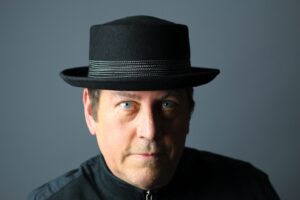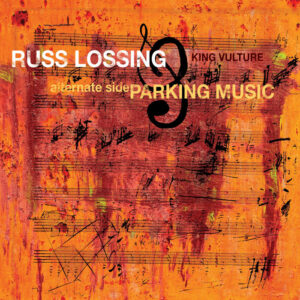Russ Lossing and King Vulture (CD Review)
Russ Lossing and King Vulture
Alternate Side Parking Music
Aqua Piazza Records
Russ Lossing, piano, keyboards; Adam Kolker, soprano and tenor saxophone, bass clarinet; Matt Pavolka, bass; Dayeon Seok, drums
Photo: Marie Bissétt
Pianist Russ Lossing has been a fixture on the New York jazz scene for over thirty-five years. His latest recording, Alternate Side Parking Music on Aqua Piazza, employs a new quartet, called King Vulture, in a set of vibrant compositions. Lossing has worked with saxophonist Adam Kolker and bassist Matt Pavolka for years. It is the addition of the abundantly talented drummer Dayeon Seok that brings a fresh perspective. King Vulture understands Lossing’s musical vocabulary well. Moreover, they inhabit these compositions in a way that stretches their seams, each player bringing their own distinctive approach to the proceedings.
“Honk” begins with the rhythm section in a fiery opening, Lossing playing a free solo and Seok drumming assertively, with fills piling on top of one another over the underlying pulse. Kolker enters, with stentorian lines. On “Cloned” distorted electric piano and octave melodies between saxophone and bass clarinet suggest an affinity with early fusion. “Next 3 km ” opens with a beautiful bass clarinet solo, followed by a melody played by Pavolka and mysterious scales from Lossing on Rhodes and piano. An angular solo and distorted fragments ensue while Pavolka double times: His facility with fast passages and twisty melodies is extraordinary. The opening tune reappears, doubled by piano, with cymbal shimmers and walking bass adorning the proceedings. It closes with repeated octaves from sax and piano, a sideways move that serves as punctuation.
“Parallel Park,” a daunting challenge in NYC. Over a nervous groove, Kolker plays an energetic soprano saxophone solo. Lossing’s solo turn has extended triadic changes and a funky suaveness: this driver does not fear a fender bender. Pavolka plays glissandos in a brief spotlight moment right before the piece’s close. “Double Park” is a move far more likely on Manhattan streets. And the “Meter Maid” is likely watching. While one doesn’t want to overly programmatize the pieces based on their titles, there are often clever connections afoot. “Double Park” begins with a chromatic bass clarinet solo, once again doubled with piano in octaves, the rhythm section subdued. The music trends bluesy, continuing an assured pose as the rhythm section begins to build. Things get angsty, with an energetic Rhodes solo and Seok building to a thunderous climax. A bass ostinato looks into a rock groove with the drummer, with the bass clarinet returning, this time trading phrases with the piano. As the piece concludes, we are back to octaves and a long decrescendo.
“Meter Maid,” on the other hand, is filled with overlapping grooves that don’t quite interlock. Fistfuls of piano clusters land on a complex melody at the same time as the saxophone and drum thwacks. The rhythm section lays out, and prestissimo exchanges between piano and saxophone are dizzying. This is succeeded by a strutting funk section that supports Kolker squalling with abandon and a fierce Fender solo from Lossing. The music presses forward, the octaves between saxophone and keys returning, with a mad dash at the conclusion. One senses that the driver didn’t feed the meter in time.
The final track, “Turn,” overlaps fourth leaps, a bass ostinato, and heavy drumming. Once again, fleet exchanges between keyboard and saxophone flurry the atmosphere, with each vying for the foreground. Lossing provides a spacey, distorted solo. Over a pressing ostinato, the saxophone breaks off to share the tune one last time, and the music evaporates.
Lossing has great chemistry with King Vulture. One hopes they will make music together for a long time.
-Christian Carey

